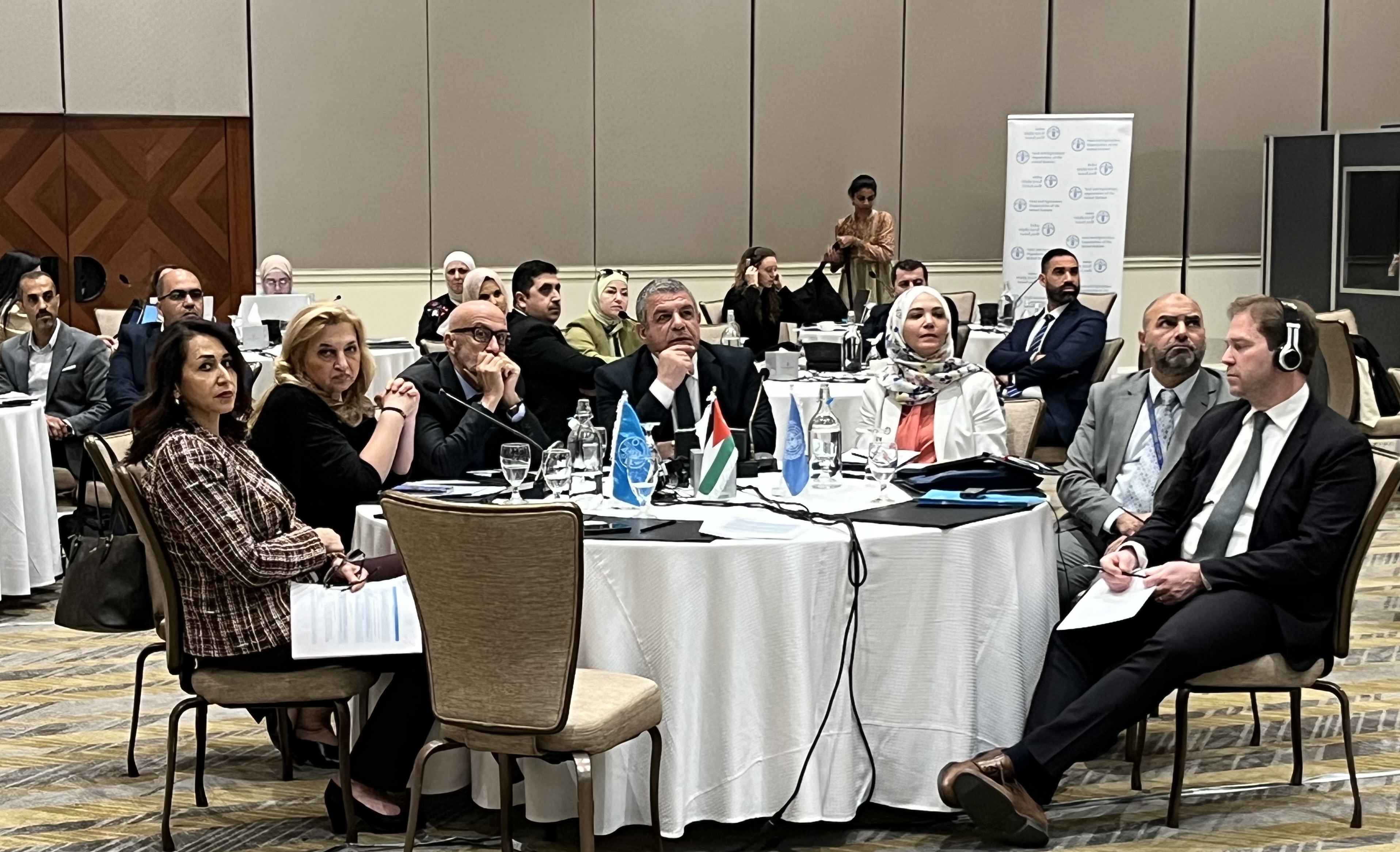FAO organizes workshop on Ecosystem-based Solutions and Utilization of Non-Conventional Water for Agriculture

©FAO
The Food and Agriculture Organization of the United Nations (FAO) organized a workshop on Ecosystem-based Solutions and Utilization of Non-Conventional Water for Agriculture to highlight need to adopt innovative approaches that prioritize the efficient use of water resources and promote ecosystem health. The workshop, organized under the FAO project “Nature-based Solutions and Green Infrastructure to address food-water-climate Complexities in Agriculture” funded by Agriculture and Agrifood Canada (AAFC), brought together representatives involved in the agriculture sector from the government, donors, academia, and non-profit organizations. Jordan is one of the pilot countries for the project.
Ecosystem-based Solutions (EbS) are approaches that utilize natural processes and components to tackle societal challenges and promote the sustainable and equitable utilization of natural resources. Harnessing non-conventional water sources, like treated wastewater and harvested rainwater, offers a chance to support traditional water sources and ease strain on freshwater reserves. Full realization of these solutions demands collaboration among stakeholders. The Hashemite Kingdom of Jordan’s Government has been investing in projects for greywater reuse in agriculture, employing economical, effective, and eco-friendly systems. UN-Water recognized Jordan's efforts in accelerating progress toward SDG 6 in 2024, assessed across five accelerators: financing, data and information, capacity development, innovation, and governance.
During the workshop, participants discussed strategies for utilizing EbS and non-conventional sources of water, identified potential entry points for knowledge exchange, synergies and complementarities for scaling up initiatives. They also deliberated on various issues that would guide future collaborations among Government donors, and other partners.
H.E. Eng. Raed Abu Soud – Minister of Water and Irrigation in Jordan stated, “Ecosystem-based Solutions offer numerous benefits for water management in Jordan, including enhancing water availability through natural water retention and recharge mechanisms. It can enhance water availability by restoring natural ecosystems, such as wetlands and forests, which act as natural reservoirs and recharge areas. Additionally, it improves water quality through natural filtration and purification processes and supports sustainable agriculture by promoting soil health and biodiversity, meanwhile increasing water efficiency by optimizing ecosystem functions, and promoting sustainable water use by restoring degraded ecosystems and habitats.”
Eng. Nabil Assaf, FAO Representative in Jordan confirmed that,” Ecosystem-based Solutions offer a pathway towards sustainable agriculture and food security in Jordan. By harnessing the power of nature, we can build resilience, conserve natural resources, and ensure the livelihoods of future generations.” He added, “FAO remains committed to supporting Jordan in its efforts to adopt and scale up these innovative approaches, and I look forward to fruitful collaborations towards a more resilient and food-secure future.”
Dr. Amani Alfarra, FAO Land and Water Officer, stated, “We are well aware of the transformative potential of EbS. To harness this potential effectively, we need guidelines that will serve as a roadmap for impact assessment. FAO is finalizing the development on an EbS tool will contribute to achieving SDG target 2.4 on sustainable food production systems and SDG target 6.5 on implementing integrated water resources management at all levels, hence fostering science and innovation to subsequently achieve international development goals.”
Dr. Jon Marco Church – Technical Expert of UN-Water shared that, “This year Jordan was selected by UN-Water as one of the three countries to be recognized this year for their progress towards the achievement of SDG 6 on water. This is the result of action taken by Jordan for several decades to improve water supply, sanitation, treatment and reuse in a context of extreme water scarcity and population growth.”
Towards the end of the event the Ministry of Planning and International Cooperation, Ministry of Water and Irrigation, Ministry of Agriculture, and the Ministry of Environment in Jordan are dedicated to working together in a collaborative and integrated approach to implementing the ecosystem approach in agriculture. By combining their expertise and resources, these ministries aim to create sustainable agricultural practices that not only support food production but also protect the environment and promote biodiversity. Through this joint effort, they are committed to ensuring that agricultural development in Jordan is done in a way that is environmentally friendly and contributes to the overall well-being of the country.
